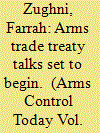| Srl | Item |
| 1 |
ID:
115749


|
|
|
| 2 |
ID:
084542


|
|
|
|
|
| Publication |
2008.
|
| Summary/Abstract |
Humanitarian reconstruction after a large-scale natural disaster has become a key site of international politics; a site where global assumptions, relationships, and responsibilities are negotiated, solidified and questioned. While post-crisis response strategies and institutional practices have strong spatial and material characteristics, these are rarely considered as significant-either to the reconstruction effort, or to international politics more generally. This article identifies and examines the "auxiliary space" created by the everyday practices of international aid workers and asks whether its effects may lead to unanticipated and potentially transformative outcomes not only for the reconstruction effort, but also for global North-South relations at large. The article concludes that post-crisis reconstruction sites may offer both cautionary and emancipatory potential for the evolution of international relations.
|
|
|
|
|
|
|
|
|
|
|
|
|
|
|
|
| 3 |
ID:
146167


|
|
|
|
|
| Summary/Abstract |
Cambodia has ratified many international humanitarian and human rights law treaties, including the Rome Statute. International crimes are also included in national legislation and have been prosecuted before the Extraordinary Chambers in the Courts of Cambodia. Based on that information alone, it may seem that Cambodia's leaders strongly support and have adopted international norms relating to prosecuting international crimes of genocide, war crimes, and crimes against humanity. Yet the reality is more complex. This article considers how different understandings of the characteristics of international criminal accountability have influenced the establishment of these mechanisms for prosecuting international crimes in Cambodia. It argues that a linear account of these developments as deriving from externally driven norm diffusion is incomplete. Instead, Cambodia's experience suggests that local and international actors have adapted and localized the norms surrounding international criminal law to develop new laws and mechanisms to prosecute international crimes.
|
|
|
|
|
|
|
|
|
|
|
|
|
|
|
|